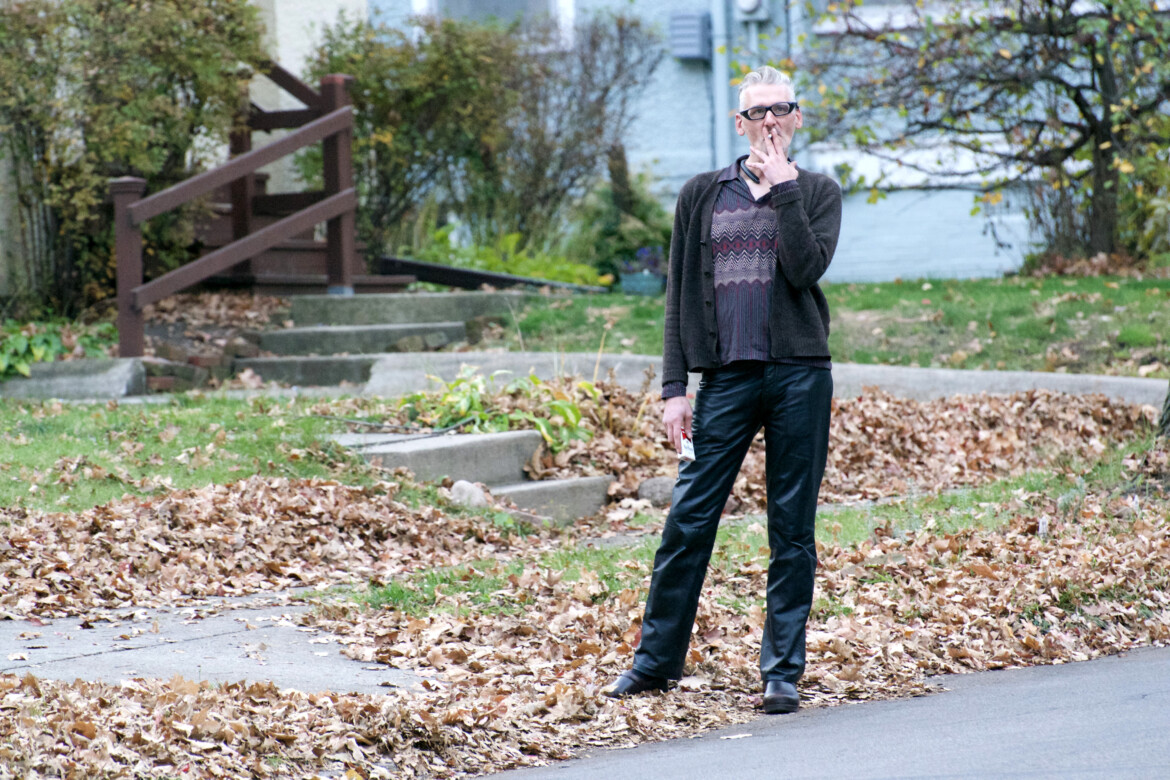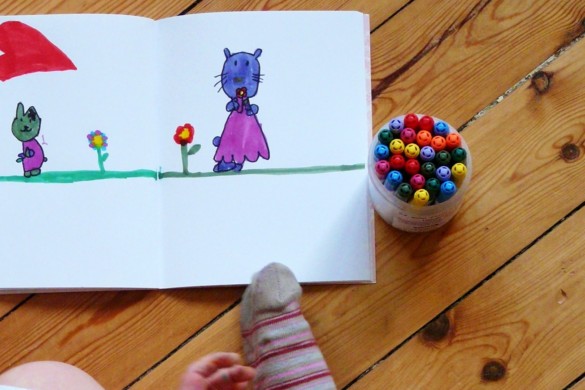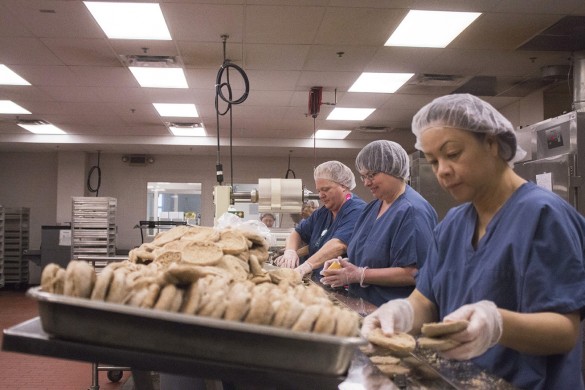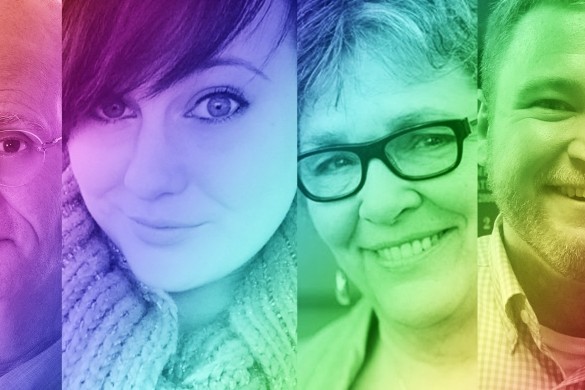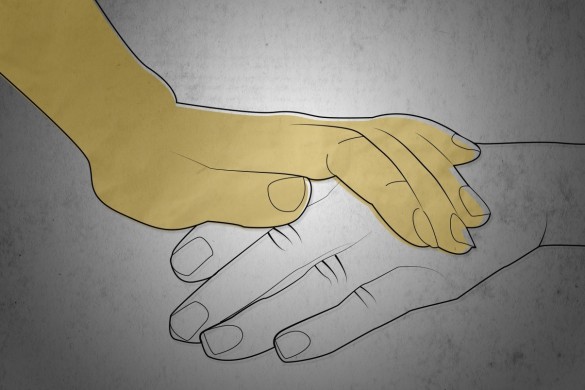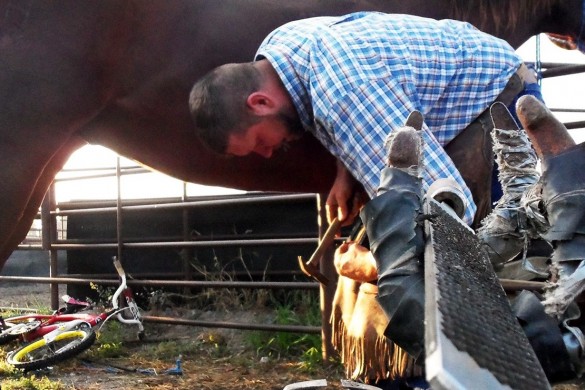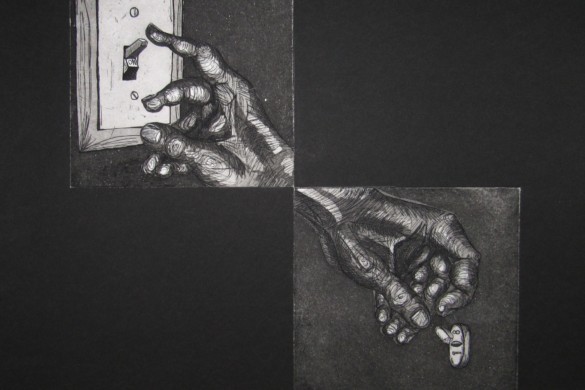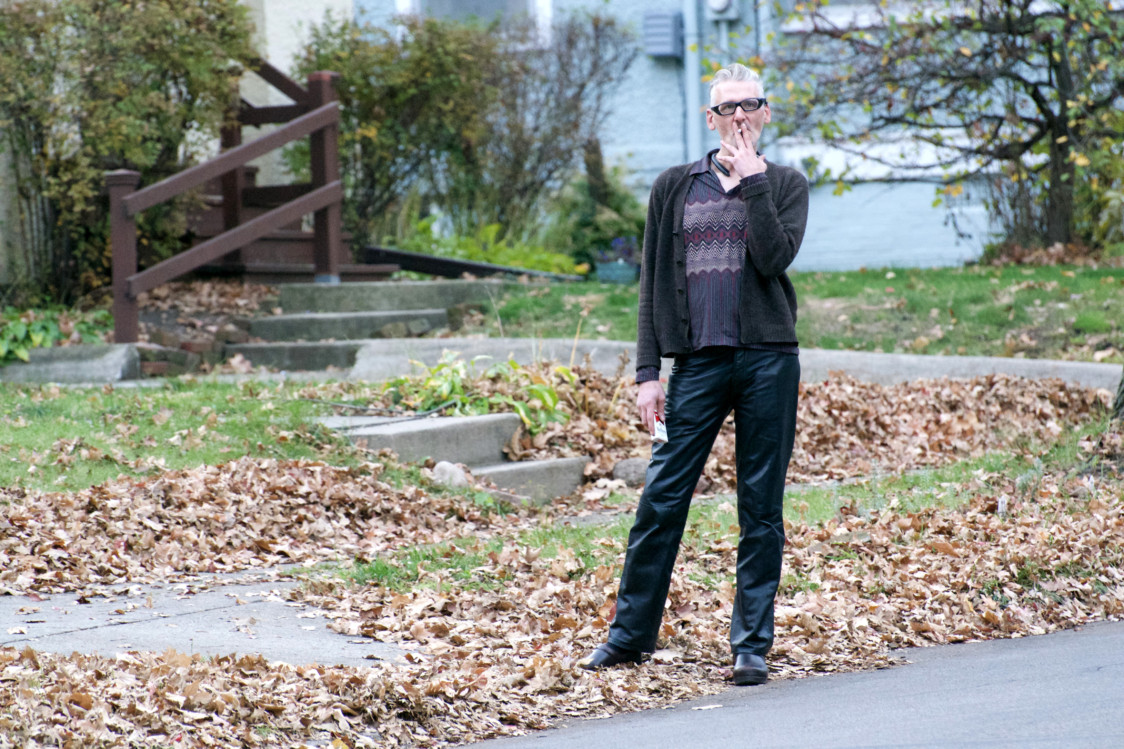
“In my natural disposition, I am extremely feminine. Female. The caregiver, the comforter,” Phillip Schmidt, who identifies as genderfluid, said.
Ones and zeroes are for computers; not people
Words and photo by Molly Lamoureux
Graphic by Emily VanSchmus
Phillip Schmidt takes a long drag of her cigarette. She exhales. Crosses one leather-panted leg over the other. Scratches the stubble on her face. And starts to talk about her earliest memory.
“I was four years old, and a little boy came up to me, pushed me down and said, ‘You’re weird,’” Schmidt said. “Everyone has always thought I was queer or feminine or girly, all throughout elementary school, and I was always picked on or harassed.”
Schmidt was born in a man’s body. You can see it in her shoulders, her jawline, her hands. But she hasn’t undergone gender-reassignment surgery. In fact, she has deliberately chosen not to. She’s genderfluid. Even so, she has always felt feminine pronouns were more appropriate. That said, when others refer to her as “he/him,” she lets it go.
“It’s easier as far as being able to relate to other people,” Schmidt said. “When I operate by those filters, it’s easier to establish a rapport, and meet their expectations or act in a way that’s agreeable to them.”
Schmidt has adopted this agreeable disposition over years of others assuming she is a homosexual male. It’s not a completely misinformed assumption, based on her towering masculine build and permanent 5-o’clock shadow. But it’s society’s need to categorize people based on gender and sexual orientation that has kept Schmidt from being her authentic self, all 42 years of her life.
And she’s not the only one who struggles with authenticity.
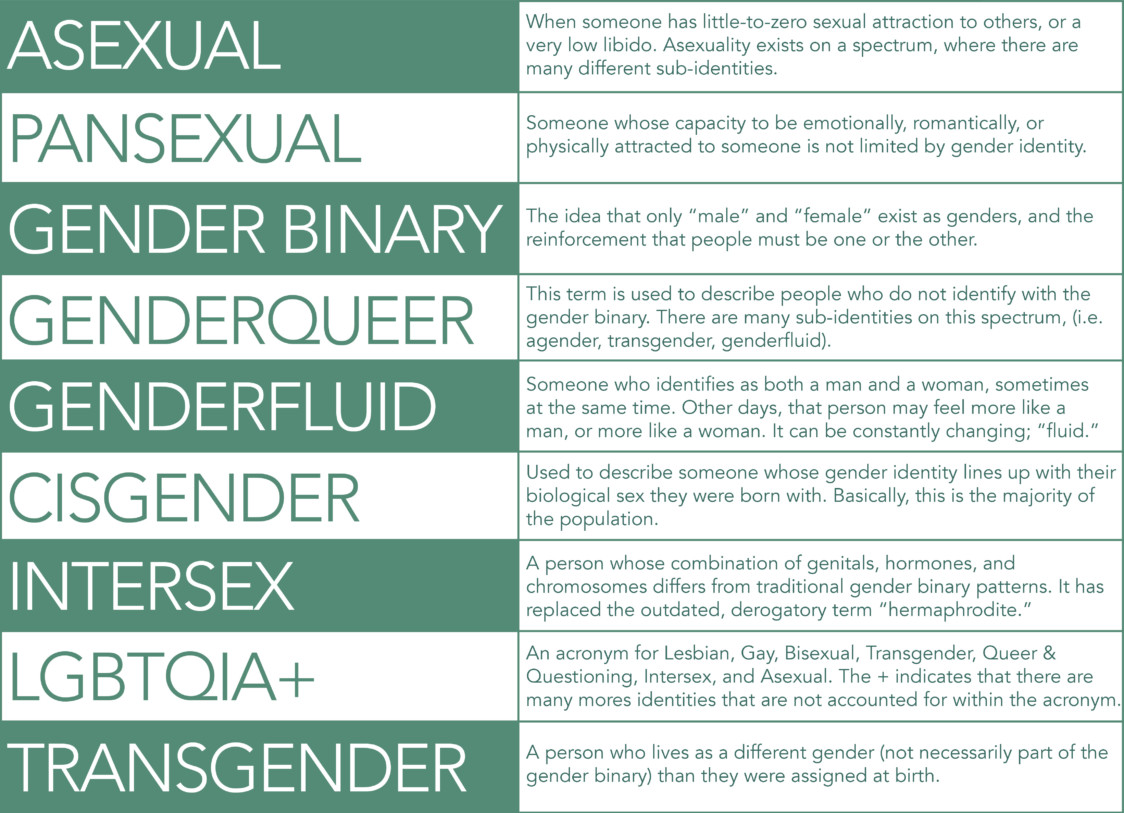
The Price of Non-Conformity
When genderqueer people try to be themselves, they’re confronted with numerous pitfalls: Non-binary people are often plagued with homelessness and poverty. They’re abandoned by their families. Dating is webbed with tension and violence. They face disadvantages when it comes to salary, employment opportunity and treatment in the workplace.
Laken Brooks, instructor and tutor of religion and literature studies at Emory & Henry College, focuses on gender and sexuality in her academic work. “I think that many genderqueer individuals face a sense of metaphorical and physical homelessness because our society is highly structured on patriarchal norms.” Translation: If you don’t fit into preconceived notions of what’s acceptable and normal, then you’re not accepted. You check a box for male or female, gay or straight when you fill out forms at the doctor’s office. But if you don’t fit in a box, it’s difficult to fit in at all.
Schmidt saw this firsthand as American’s attitudes toward gays and lesbians changed during her lifetime, while she still felt alone. According to Pew Research, opinion on gay marriage has flipped in America over the last 15 years. In 2001, 57 percent of Americans opposed it. Now 55 percent approve of it. But gays and lesbians are still classified as binary. Many genderqueer people are still left out, leaving them feeling discarded or unrecognized.
“Even some members of the larger LGBTQ+ community are unwelcoming of those who are gender-nonconforming,” Brooks said. Each letter of “LGBTQ+” stands for a separate, smaller community: Lesbians, gay, bisexual, transgender, queer “plus” asexual and intersex—and even more identities fall beneath these terms. This leaves those who don’t fit into that framework outsiders within their own community.
And feeling like an outsider at every turn can have serious consequences. According to the American Foundation for Suicide Prevention, 41 percent of gender-nonconforming people will attempt suicide in their lifetime. That percentage is raised if respondents had lost a job due to bias or experienced discrimination in the workplace (50 to 65 percent suicide attempt rate), were harassed/bullied in school (50 to 78 percent), were victims of housing discrimination (54 to 69 percent), or were the victim of physical or sexual assault (often exceeding 60 percent).
To Schmidt, these statistics are more than just numbers. She’s attempted suicide. Unable to bear the weight of daily ostracization or cruel harassment, she’s flirted with that line between life and death three times. And each attempt resulted in different—but equally poignant—experiences. She thinks these experiences pushed her to fulfill the life she was given this time around. She believes in karma and past lives and has decided that being born in a man’s body is the universe’s way of allowing her to serve her penance.
“I have a feeling that over the journey of my past lives. I’ve become way too good at manipulating guys.” Her fingers hide a smirk as she takes a long drag of her cigarette. “And treating guys really shitty. And in this life I have to be a guy because I need to learn some humility. I’m learning [things] that I couldn’t learn as a woman.”
The Not-So-Iron Fist of the Law
But with help from advocates, the world can become a friendlier place for people like Schmidt. Lobbying for safe schools and fair documentation can put protections in place for non-binary people. Voting for candidates—at both local and national levels—who will work to protect laws and acts like Title IX and the Violence Against Women Act, can also be a step toward equality.
Marisa Richmond is a transgender studies professor at Middle Tennessee State University and the first transgender person to receive a government appointment in Tennessee on the Metro Nashville Human Relations Commission. Richmond knows that the genderqueer community faces a lot of adversity.
Hate Crime:
“We have passed two trans inclusive laws at the federal level,” said Richmond. “Shepard-Byrd Hate Crimes Act of 2009 and Violence Against Women Act of 2013. We hope the new Justice Department will continue enforcement of hate crimes against trans people. At the state level, about a dozen states have their own laws.”
Incarceration:
Genderqueer people who are incarcerated are often put in gender-inappropriate facilities. “The U.S. Department of Justice made recommendations to the states, but the states were under no obligation to follow those guidelines,” Richmond said.
Documentation:
“At the federal level, we got rid of the surgical requirement for both passports and Social Security,” Richmond said. “Although there is concern that either or both could be reversed in the [Trump] administration.” At the state level, primary documents include birth certificates and driver’s licenses. Richmond said some folks have been able to work around the surgical requirements for these in Tennessee, but there are still many states that haven’t considered changing these requirements at all.
Employment:
Sex stereotyping was banned by Title VII, but there is nothing explicit about discrimination in the workplace against genderfluid employees. There have been pushes towards stronger enforcement of Title VII in the 31 states that don’t have protections at local levels, but Richmond notes the possibility that those enforcements may cease under Trump administration as well.
These issues, among others—safe schools, health care, immigration, homelessness—revolve around the outdated practice of only recognizing two genders. And it’s this harsh, zeroes-and-ones construct that plagues non-binary people every day.
“The thing that frustrates me the most is people…want to think of humans as discrete units. As specific values,” Schmidt said. “We’re not a point on a graph. We’re a line of variation.”
Not a Facsimile
Schmidt ultimately decided against gender-reassignment surgery. And not all non-binary people want gender reassignment. Richmond stresses the importance of being sensitive and informed of all non-binary lifestyle choices.
“You should never assume that a transgender person has transitioned [or if they want to]. It would be better to ask if they have come out of the closet, and if so, how they did so,” Richmond said. “Transition varies for each person.”
She goes on to explain that inquiring about a person’s surgical status is extremely personal and should be off-limits. You wouldn’t ask a new friend when their last surgery was. That applies to all people.
People like Richmond are contributing to the non-binary community’s progression. But the progression is sluggish, at best. And many fear progressive steps that have been made are in danger of being reversed under the new administration in 2017, according to Richmond. The idea that cisgender people need to accept non-binary individuals for who they are without discrimination requires a change in societal framework. To restructure something so ingrained in society is no easy feat, making it impossible for an entire community of people like Schmidt to be comfortable in their own skin.
“I’ll never be a woman,” said Schmidt adamantly. “I decided that when I was [ten.] I could either spend the rest of my life trying to make my body fit my inside or learn to live with what I have on the outside.”
And she chose the latter. “[I] want to have a uterus. I want to have ovaries. I want the whole experience,” Schmidt continued. “I don’t want to be a facsimile. Or a version.”
She hangs her head and watches her cigarette burn between her fingers. The ashes pitifully sprinkle onto her brown cable knit cardigan. Her agreeableness to the new layer of debris is disheartening and uncomfortable.
When he left me because I couldn’t give him a son…it made me feel hollow.”
– Phillip Schmidt
Like many other non-binary people, it’s this inability to bear children that troubles Schmidt most. When she fell in love with a man whose words hurt her, “I’m not a cocksucker,” and “except for the fact you have a dick, you’d be the perfect woman,” it only pushed her to want to please him more. But she couldn’t give him the one thing he wanted. A child.
That kind of treatment, reiterated day after day for 18 long months, was the relationship’s undoing. “When he left me because I couldn’t give him a son…it made me feel hollow. It made me realize that as feminine as I was…” she said, trailing off.
Schmidt cares for her parents in their old age now, and doesn’t date anymore. She doesn’t spend time trying to make friends either. Forty-two years of trying too hard, just to be neglected and discriminated against, has left her in a mixed state of apathy and depression.
She draws the last cigarette from the box and tries to light it. The lighter clicks a few times before she tosses it on the ground, a flameless metaphor.
“I don’t know what [happy] is. I don’t know if I ever have.”

